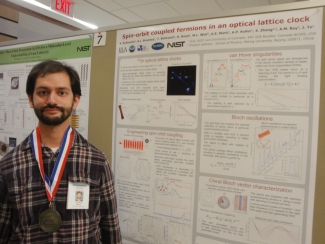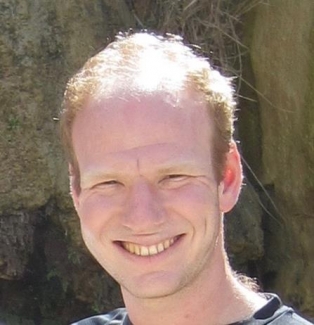NRC Postdoc Ed Marti received an Outstanding Presentation Award for his presentation of the poster "Spin-Orbit Coupled Fermions in an Optical Clock" at the 2016 Boulder Laboratories Postdoctoral Poster Symposium held on July 20. This recognition was shared with NRC Postdoc Shimon Kolkowitz, who originally submitted the abstract as well as prepared the poster and a two-minute–two-slide synopsis of the work. Marti did a great job with both the oral and poster presentations even though he had just one day's notice after family matters kept Dr Kolkowitz from participating in the conference.
The citation for the Outstanding Presentation Award reads "The Outstanding Presentation Award is a special recognition for selected poster presenters at the Boulder Laboratories Postdoctoral Poster Symposium. This recognition was selected by senior scientists who circulated through the poster session and noted outstanding quality in both preparation of a poster and its oral presentation."
Marti's and Kolkowitz's co-authors on the poster were graduate students Sarah Bromley, Tobias Bothwell, and Andrew Koller; group collaborator Daniel Reed from the University of Birmingham; senior research associate Michael Wall; former research associate Xibo Zhang; and Fellows Ana Maria Rey and Jun Ye.
"We consider it remarkable, and a testament to the collaborative research in (Ye group), that Dr. Marti gave both the oral and poster presentations on July 20 with a one-day notice," said Dr. Joseph Magee, conference chair.
The 2016 Boulder Poster Symposium held on July 20, 2016, is the 13th in this annual conference series. The award was initiated at the 1st symposium organized in 2004 in honor of the Boulder Laboratories 50 Year Anniversary. The sponsor of this year's even was the Boulder Labs Diversity Council.




 The Physics Frontiers Centers (PFC) program supports university-based centers and institutes where the collective efforts of a larger group of individuals can enable transformational advances in the most promising research areas. The program is designed to foster major breakthroughs at the intellectual frontiers of physics by providing needed resources such as combinations of talents, skills, disciplines, and/or specialized infrastructure, not usually available to individual investigators or small groups, in an environment in which the collective efforts of the larger group can be shown to be seminal to promoting significant progress in the science and the education of students. PFCs also include creative, substantive activities aimed at enhancing education, broadening participation of traditionally underrepresented groups, and outreach to the scientific community and general public.
The Physics Frontiers Centers (PFC) program supports university-based centers and institutes where the collective efforts of a larger group of individuals can enable transformational advances in the most promising research areas. The program is designed to foster major breakthroughs at the intellectual frontiers of physics by providing needed resources such as combinations of talents, skills, disciplines, and/or specialized infrastructure, not usually available to individual investigators or small groups, in an environment in which the collective efforts of the larger group can be shown to be seminal to promoting significant progress in the science and the education of students. PFCs also include creative, substantive activities aimed at enhancing education, broadening participation of traditionally underrepresented groups, and outreach to the scientific community and general public.